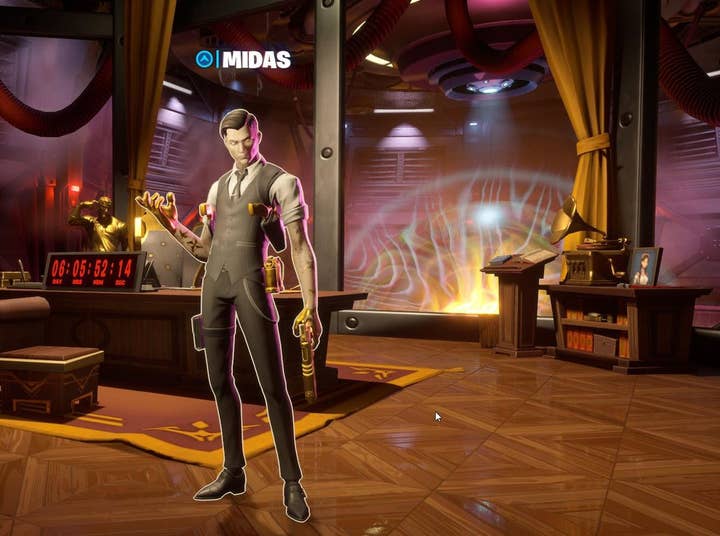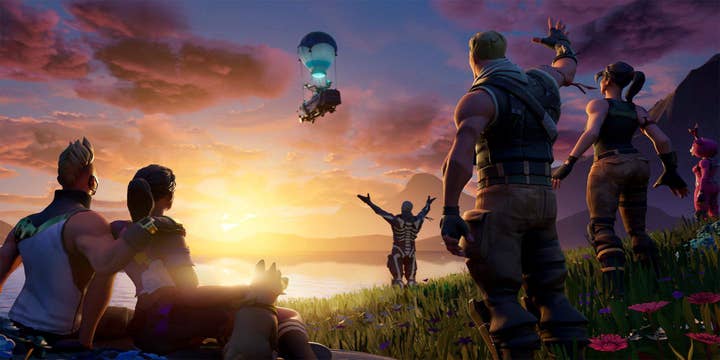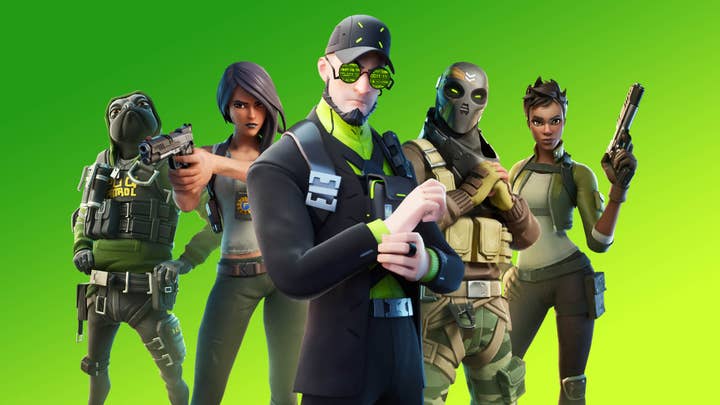Fortnite is a masterclass in flexibility | Opinion
Epic's battle royale is a cultural phenomenon due to a will to challenge fundamental ideas about what a game is and what its players want to experience
Watching the flood (pun entirely intended) of news articles pour in this week about Fortnite's latest huge in-game event, I wondered idly for a moment if somewhere in the bowels of Epic's studio there's a situation room with its walls covered in the long-term plan for the game; a roadmap set out three or four years ago, upon which some ambitious and visionary soul had pinned under the heading "Year Three" such things as "in-game virtual concerts by global star artists" and "take the game offline for a while but make it into a meta storytelling event that'll be reported with wide-eyed bemusement by even the mainstream press."
Looking at the extraordinary evolution of Fortnite Battle Royale since its launch in 2017 naturally summons such peculiar thoughts to mind. The fact that no such wall exists -- if it does, I might trouble the crystal ball gazing geniuses behind it for some stock tips -- actually makes what Epic has done with Fortnite even more impressive.
"Players only turned to Twitch at all because they couldn't log into the game... The Twitch record was broken through overspill alone"
It's not just that Fortnite has maintained its success and popularity for three years -- we've had long-lived online titles before, even if the likes of World of Warcraft and GTA 5 never quite touched the sheer mainstream appeal of Fortnite. It's not even that it's maintained that popularity with a young-skewing audience, who tend to be dramatically fickle in their tastes. Rather, it's that Fortnite has gone beyond mere player numbers and commercial success; the choices Epic has made with the game since its launch have pushed Fortnite into being an outright social phenomenon, not just a popular game but a defining part of life for literally hundreds of millions of players of a certain generation.
As a consequence, Fortnite continues to break records left, right and centre, long after most other games of this kind would have been well past their peak. This week it was the turn of Twitch's concurrent stream record, with Fortnite smashing through the previous record of 1.7 million concurrent viewers -- set by League of Legends last year -- by having 2.3 million concurrent viewers watching the story event that marked the end of the current "season" of the game.

Perhaps more impressively, those players only turned to Twitch at all because they couldn't log into the game, which had been capped at 12 million concurrent players for the event -- that the Twitch record was broken through overspill alone. Another 6.3 million people also watched the stream on YouTube, implying that at least 20 million people were tuned in live to watch a brief story event in an online game whose story is not so much tangential to the experience as entirely off to one side from it.
How Epic has bottled this lightning is a masterclass in operating an online game, and in keeping an open mind about what your players want from you. Having a story at all is a weird sidestep for Fortnite, but it pales in comparison to the leaps of imagination and logic required for a host of other things the game has implemented and evolved into over the past three years. At its core, Fortnite launched as a Battle Royale game not all that dissimilar from the already-popular PlayerUnknown's Battlegrounds, but three years down the line it's so much more.
"Epic recognised early that players were treating it as a space for social and creative expression, and it leaned into that hard"
Fortnite has evolved into a virtual hangout space for an entire generation of young people, replete with social features, enormous virtual concerts and events, bold updates that spark headlines in even the most mainstream of publications, and hand-wringing editorials about parents who can't comprehend what their offspring are doing on this weird, cartoonish island.
To that latter point, a lot of other game consumers -- especially older game consumers -- might have a twinge of sympathy for the parents for once, because Fortnite is a bit of a mystery to many gamers as well. Battle royale games are easy enough to understand, but everything else that Fortnite is and everything else that it represents to its playerbase is utterly bemusing, to the point where older players talking about it often sound quite exasperated. Why would you have a giant virtual concert happening inside a shooting game? Why are people logging into a game where the object is to survive, and instead putting on funny costumes and hanging out together dancing? What on earth do the weird characters and meta humour that pop up in Epic's trailers for new updates for the game have to do with, well, anything? What even is this?
It's not that the notion of a regularly updated online game -- even one which evolves pretty dramatically over time -- is in itself a new thing. That a game needs to stay fresh to keep players interested is something that every online game worth its salt since the 1990s has innately recognised. World of Warcraft and League of Legends were founded on a premise of evolution, changing things up and adding or altering content in order to ensure that players never get bored or over-complacent.

What Fortnite is doing goes beyond that, though -- it's not just that they're altering the map or changing weapon balance to keep things fresh. You could pop a player of the original World of Warcraft release down in front of the most recent expansion pack and it would all make sense as a logical evolution of the game. Drop a Fortnite player from 2017 in front of the Travis Scott concert event or this week's The Device story event, though, and they'd start questioning you about your history with illicit medications.
This is Epic's remarkable strength and achievement -- a level of flexibility not just in updating its game, but in being willing to rethink the most basic notions of what the game is and what its players want. Epic recognised early on that players were treating it as a space for social and creative expression, not just as an arena for gun battles, and it leaned into that hard. That recognition has allowed it to play with the fundamental notions of the game and do distinctly un-game-like things with it.
"There are other excellent battle royale games, but their shared weakness is that they all insist on being battle royale games"
The storyline events, the Travis Scott concert, the Christopher Nolan movie trailer release -- on the face of it, none of these things make the slightest lick of sense in the context of Fortnite's core battle royale gameplay, but all of fit perfectly with Fortnite as a broadly defined space for social expression.
Moreover, Epic has recognised that Fortnite isn't a game that exists in a vacuum; it's a game that exists online at a time when we have all never been quite so online. Fortnite is a game of the now precisely because it recognises the ecosystem -- Twitch, YouTube, social media, news sites, and all the rest of it -- in which it exists. The game does enormous, one-off events which undoubtedly aren't cheap to create. It alters its game-world irrevocably and treats the whole experience as a fluid and transient thing.
It's a game archivist's worst nightmare, incidentally, but it's rendered possible by the fact that every key moment will be saved forever, frozen in time as countless YouTube videos and Twitch streams. For the players who were there to see it live, the event feels all the more special because it will never be repeated. That too serves to reinforce the sense of society around Fortnite, the sense that the whole game is a shared experience.
I'm not sure that this notion of the game as a social space or the game as a shared experience is one that any other companies operating in this genre fully, truly understand. There are other excellent battle royale games out there, but their shared weakness is that they all insist on being battle royale games. They miss the fact that Fortnite -- both through the actions of its players and its creators -- has quietly adapted itself into something more than that, something that's often at a bit of a tangent from gaming concepts generally.
The only comparable game in terms of the broad social appeal is probably Minecraft -- a very different game, but one with similar underlying ideas about social behaviour and shared experiences. It seems safe to say that whatever ultimately challenges Fortnite will probably not be another battle royale game, but another left-field experience that's as different from Fortnite as Fortnite is from Minecraft.
It's going to be a tough game to dethrone, though, because Epic's approach to evolving Fortnite is one that lives up to the studio's name. The sweeping scale of the changes it's willing to make turns Fortnite into a moving target for any rival, a constant source of delight for its players, and a never-ending source of confusion for everyone else.

